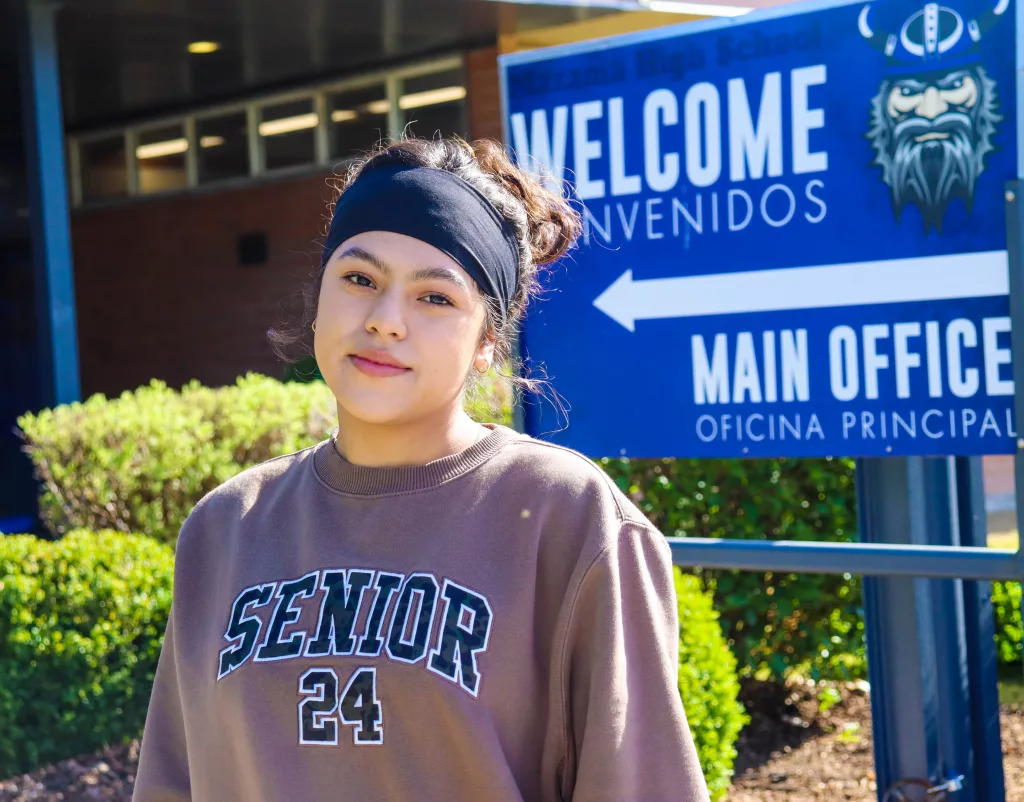When Alexia Aguilar transferred to Mazama High School in March, the senior spoke no English. This Friday, the 19-year-old will walk across the stage at Viking Field and receive her high school diploma, ready to take the next step towards her dream of a nursing career.
Alexia, who moved to Klamath Falls from Michoacán, Mexico, will be the first graduate from the school’s Newcomer Program, which started two years ago to provide resources for students who are new to the English language.
“I was so scared,” she said, her words translated for this interview by Newcomer Program teacher Laura Villanueva. “Everything is so different … sometimes I’m still scared. The hardest part is not being able to express yourself.”
Alexia credits the Newcomer Program for helping her assimilate into the culture of a U.S. high school and providing the support and resources she needed to succeed.
“At first, I felt alone and confused,” she said. “Now I feel like I’m in the right place.”
Of the 10 students in the program, eight are from Mexico, one is from Cuba, and one is from Vietnam. Alexia is the only senior. The others are on track to graduate with their class.
The program operates with a three-prong approach: Language acquisition, cultural immersion, and academic achievement.
“It provides all students new to speaking English a school with space for a lot of support, giving them an opportunity to learn the language, be successful, and graduate,” said Jennifer Hawkins, principal at Mazama High School.
Alexia moved with her mother and four younger siblings to Klamath Falls to join her father, who has been in town for the past three years working at El Torito, a Hispanic market and deli on Washburn Way. She and her 16-year-old brother chose to attend Mazama because of the Newcomer Program. Her other siblings are 12, 8, and 4.
A lot of her spare time was spent studying this spring, she said, because some of the teaching methods were different and, of course, the language barrier made understanding more difficult. She also works part-time six days a week at El Torito as a cook and cashier. Though she didn’t play sports at Mazama, she participated in soccer, basketball and track while in Mexico.
Her school in Mexico did not provide electronics such as iPads and laptops to students, but at Mazama she is able to use a laptop and iPad as part of her coursework, and the translation features online also help her communicate with her classmates and teachers.
During her First Aid and Beyond class, a dual credit course through Klamath Community College, Alexia and her teacher, Lauren Lorenz, used Google translate on her laptop to clarify a question, which Alexia then correctly answered.
“She’s an excellent student and works hard,” Lorenz said.
All Newcomers spend the first period of the day with Villanueva in a class called Secondary Language Development, learning about the U.S. culture and practicing English skills.
Sergio Cisneros, vice principal at Mazama High School, said students seem to be embracing the Newcomers, and the Newcomers are embracing the high school culture. Three Newcomers participated in athletics this year, and all 10 attended the high school prom.
“They all asked someone to prom, and some asked non-Newcomers to go to prom with them,” Cisneros said. “That takes a lot of courage.”
In addition to a full-time teacher, the program has two full-time bilingual paraprofessionals, who attend some classes with students and help them with translations and understanding the coursework. Villanueva also provides support in the classrooms.
Villanueva said Aguilar, who will graduate with a 3.6 GPA, is doing well both academically and socially.
“She doesn’t always see the progress she’s made,” she said. “She just sees that she can’t communicate very well yet.”
Alexia said learning to speak English fluently is her next step. She plans to take classes and learn the language before attending college to study nursing.
“After I learn English, I think everything will flow into place,” she said. Her advice for others: “Even if you’re scared, you need to try. Don’t let language be a barrier.”
Hawkins and Cisneros believe the success of the Newcomer Program goes beyond getting students to graduation. They tell a story of another Newcomer student, who two years ago was resistant to attending school at all – he just wanted to start working. Now he enjoys school, has good attendance, is on track to graduate, and often attends an hour-long homework help session after school.
“His mindset about the value of education has shifted, and now it’s a priority,” Cisneros said.
Though the $230,000 grant that was used to start the program wasn’t renewed, the past two years has provided a foundation that will allow the school to continue offering the resources Newcomers need.
“It will look a little different, but we have all the pieces we need to sustain it and to keep it successful,” Cisneros said.

